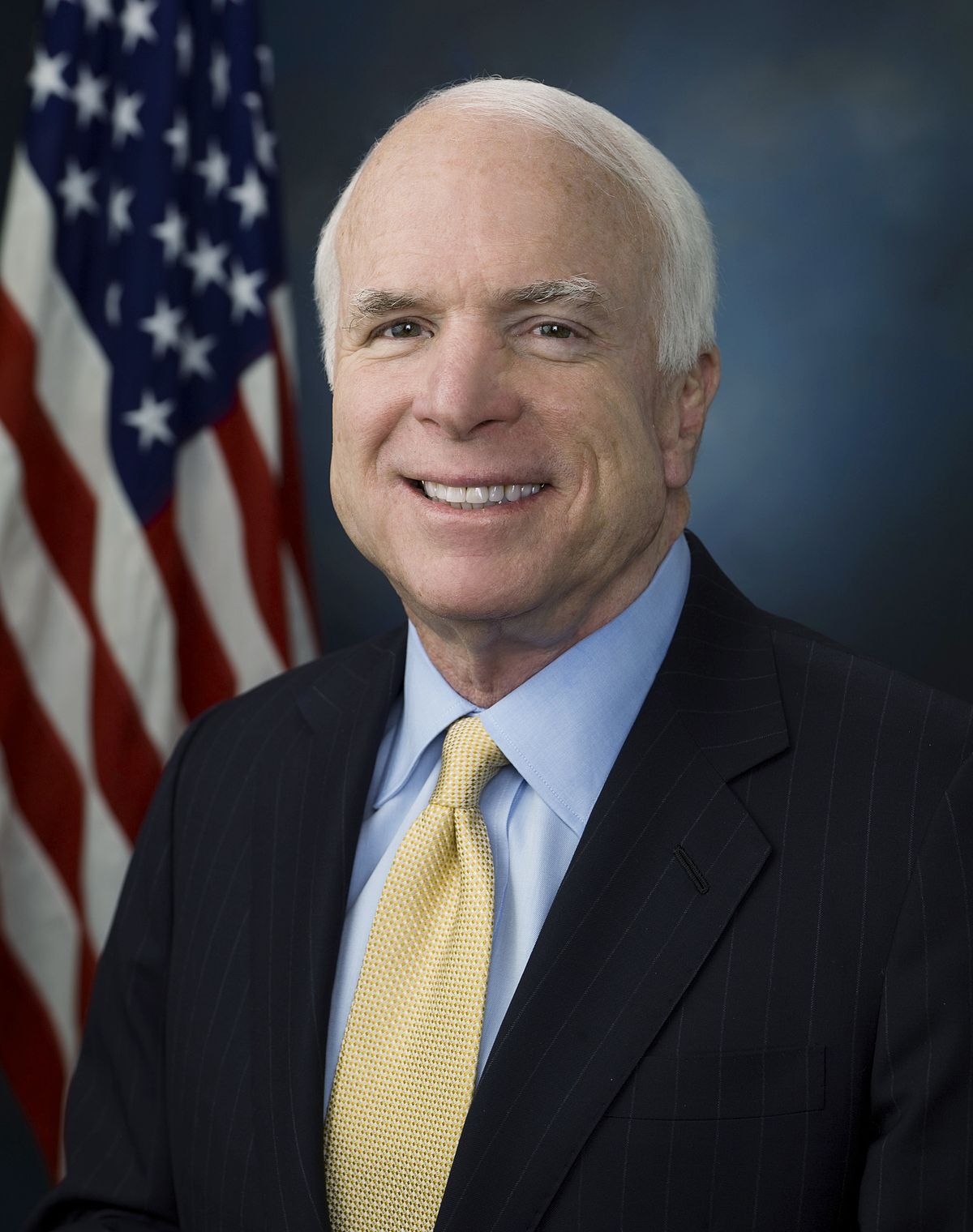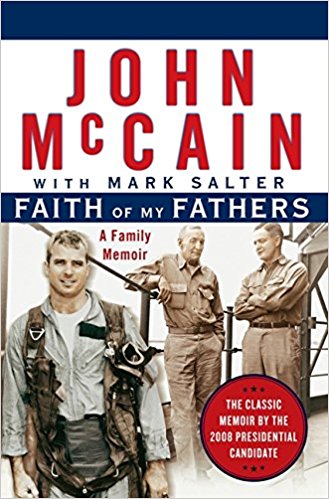Faith of my Fathers Summary
6 min read ⌚
 A Family Memoir
A Family Memoir
The two role models in Senator John McCain’s life were both admirals: his granddad, John (Stew) Sidney McCain Sr. and his dad, John (Jack) Sidney McCain Jr.
Who Should Read “Faith of my Fathers”? And Why?
In this personal history, U.S. Senator John McCain writes about the persons and situations that played a significant role in forming his pre-political life. He talks about the influence his family members and childhood events had on his life and career: first his grandfather, then his father, and moreover his training.
Furthermore, McCain commits whatever remains of the book to his imprisonment in North Vietnam. He presents his life as a POW, hard five years that influenced him profoundly and installed his faith in duty, strength, and comradeship.
Readers who are more interested in finding out about McCain’s political path should find another book on the topic since he does not cover them here.
We recommend “Faith of my Fathers” to those who would like to reveal what created McCain’s value system and political power, presented between the lines of this family saga and convincing war story.
About John McCain
 John McCain has served two terms in the U.S. House of Representatives and has been a senator from Arizona since 1986. He has four children and seven grandchildren and lives in Phoenix with his wife, Cindy. Mark Salter has been McCain’s administrative assistant since 1993.
John McCain has served two terms in the U.S. House of Representatives and has been a senator from Arizona since 1986. He has four children and seven grandchildren and lives in Phoenix with his wife, Cindy. Mark Salter has been McCain’s administrative assistant since 1993.
“Faith of my Fathers Summary”
As a child of a maritime officer, McCain for the majority o the time. He was rambunctious, yet he acknowledges his mom for showing him how to find bliss in life and how to fight difficulty.
Since the family moved so regularly, McCain had to make friends quickly. He attempted to grow profound connections although he knew they were bound to be interrupted.
While he laments the companions he lost in his life, he acknowledges that misfortune as a reality of military life. He went to boarding school at age 15, went to mandatory daily chapel, and tried to qualify equally in both academics and athletics.
A couple of months after his secondary school graduation, his dad took him to the U.S. Maritime Academy at Annapolis, for which he had been preparing for as long as he can remember.
However, he feared it. Everybody took similar courses and persevered through the same initiation process. In the end, he graduated fifth from the bottom of his class. He discovered that to build self-respect, he needed to serve a larger purpose – a lesson that changed his life.
Accordingly, to his new insight, he went to flight school in Pensacola, got hitched and in 1966, left to fight in Vietnam.
On October 6, 1967, McCain went on a mission, flying over Hanoi, which had the most significant anti-aircraft framework ever utilized as a part of the battle. At 9,000 feet, his radar showed that a SAM rocket was following him, yet he continued onward and discharged his bombs on his objective.
He was at around 3,500 feet when a SAM brushed a wing off his plane. He ejected, yet hit the plane, and broke the two arms and his knee. Finally, he landed on a lake in Hanoi, from where they took him to a jail nicknamed the “Hanoi Hilton.”
He could not eat for days, as a consequence of his untreated wounds and injuries. At the point when his captors found out that his dad was an admiral, they sent him to a hospital where he got blood and glucose. Following a month and a half in the hospital, they sent him back to jail.
While enduring fever and dysentery, he was sent to another prison, where he started two years of confinement, which tested him in every way possible. He created memory games, offended the guards, prayed, and performed various scenes from motion pictures and books. Just like all the other prisoners, he experienced wild feelings as well. The constant anxiety showed him that love and honor persist in any conditions.
One of the POWs’ basic exercises was speaking with different detainees using codes and notes. They talked into cups squeezed against the walls that divided them. To keep hope alive, they remembered the names of various detainees in case somebody got discharged.
McCain refers to this correspondence, particularly with the man in the neighboring cell, as one of the things that kept him alive.
Being a war prisoner gave McCain essential insights and taught him valuable lessons, including the need for balance between his independence and dependence on others. He understood that being associated with other individuals made him more autonomous and all the freer.
Key Lessons from “Faith of My Fathers”
1. Family Secrets
2. Demands of Honor
3. Lessons Learned
Family Secrets
At age 61, Stew finished his duty in Tokyo, seeing Japan’s surrender, and went home to California. At the gathering celebrating his return, he had a heart attack and passed on.
Sometime later, John McCain read a book that uncovered a family secret: around three months before his granddad’s heart assault, the Navy had taken away his charge. The reason behind this was that he postponed an order from Halsey to turn around the fleet’s course to evade a hurricane.
The storm destroyed 141 planes, damaged ships, and killed six mariners.
Ensuing stories demonstrate that he was altogether a Navy man and a great individualist who lived heartily.
His men loved him, and he cried when perusing loss reports. In his childhood, Sen. Pleased with his warrior ancestry; John McCain concluded that he needed to contribute to his family’s record.
Demands of Honor
John Sidney McCain Jr. entered the U.S. Naval Academy at 16 years of age. He was 5’6″ tall and 110 pounds, and thus toughed out the tiring physical demands. However, he positioned in the last 15% of his class academically.
He earned almost the maximum number of bad marks he could get without being ousted. In the wake of graduating and being rejected for flight school, he joined the submarine.
Jack cherished everything about the Navy, was sincere and prayed every day. Conversely to the right habits, he chain-smoked and drank intensely until he kicked the bucket.
Lessons Learned
In 1968, McCain’s captors offered to discharge him, which, he later found was a publicity move in response to his dad’s assignment as the top commander of the U.S. Army in Vietnam.
The foe was planning to demonstrate unique treatment to the admiral’s child over different POWs. However, McCain rejected the offer since it disregarded the Code and would have furnished his captors with a propaganda triumph.
The Code stated that detainees could be discharged just in the order in which they imprisoned them. Hence, those held the longest was supposed to be released first. As he expected, The North Vietnamese countered his response by tormenting him for days.
They constrained him to sign a confession and make a recording that he had been an “air pirate” and got the medical treatment he did not deserve.
Like this summary? We’d Like to invite you to download our free 12 min app, for more amazing summaries and audiobooks.
“Faith of my Fathers” Quotes
In prison, I fell in love with my country. I had loved her before then, but like most young people, my affection was little more than a simple appreciation for the comforts and privileges most Americans enjoyed and took for granted. It… Share on X Nothing in life is more liberating than to fight for a cause larger than yourself, something that encompasses you but is not defined by your existence alone. Share on X While serving as a pallbearer for one of his Naval Academy classmates on a cold, rainy day at Arlington National Cemetery, my grandfather listened to a young officer suggest that he button up his raincoat to protect himself from the… Share on X I don’t feel that way about the war, I replied, and was threatened for what seemed like the hundredth time with a warning that I would be denied an operation because of my bad attitude. Share on XEmir is the Head of Marketing at 12min. In his spare time, he loves to meditate and play soccer.


 A Family Memoir
A Family Memoir




